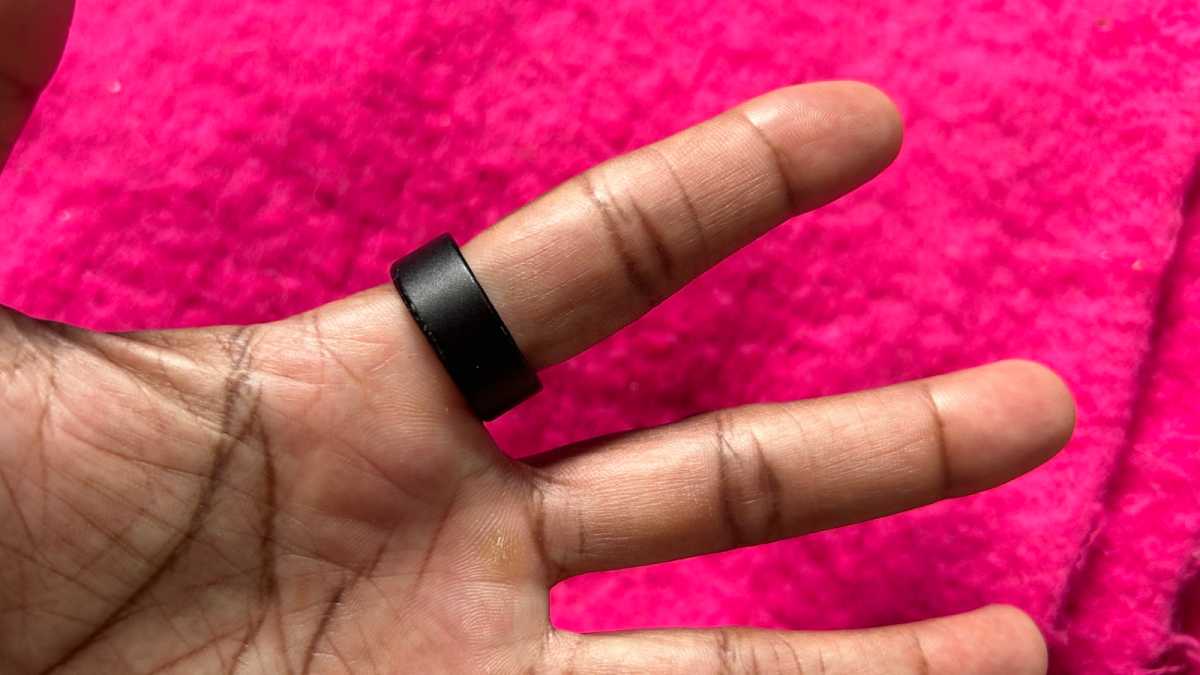Expert’s Rating
Pros
- Light and comfortable to wear
- Continuous heart rate monitoring
- Two battery modes
Cons
- Unreliable tracking
- Busy companion app
- Slow data syncing
Our Verdict
The Circular Ring Slim delivers some solid fitness and wellness tracking from your finger, but the software experience that goes with it needs refining to make it well-rounded experience.
The Circular Ring Slim is another smart ring that wants to bring fitness and wellness tracking to your finger and is currently the slimmest smart ring you slip onto one of your digits.
The subscription-free ring also comes in cheaper than the Samsung Galaxy Ring and the Oura Ring Gen 3 and promises to track similar metrics including heart rate, temperature, sleep and daily steps.
It’s also includes an AI assistant to make recommendations based on your data to help you stick to healthier habits. It’s an attractive prospect as it comes in less than the big-name smart ring competition, and does put in a good tracking performance with some things that need to be worked on.
Design & Build
- Slimmest smart ring available
- IP68 water resistance rating
- Small charging dongle
To massively confuse matters, Circular has three smart rings and two of those three smart rings are slim versions. There’s the Circular Ring Pro, which features interchangeable outer shells, then there’s the Circular Ring Slim Light, which I’ve also tested, and mainly lacks the haptic vibrations you do get on the Circular Ring Slim tested in this review.
The model has been around for a little while but the firm has upgraded it without changing the name – not even with a ‘2024’ moniker. Rest assured, this review is of the brand-new version.
The Circular Ring Slim weighs just 2g, so it’s satisfyingly light and measures 2.2mm thick, which makes it thinner than the Samsung Galaxy Ring (2.6mm) and the Oura Ring Gen 3 (2.5mm), which is pictured below alongside the Circular Slim.
It comes in just one matte black look and unlike other titanium-based rings, Circular has opted for a mix of aluminium and carbon fiber with a non-metallic inner where the sensors lie. It’s a bit of a plain ring to look at and doesn’t scream stylish in the same way that Oura and Samsung’s ring clearly do but it will suit if you want something subtle.
It does, however, seem to have handled fending off scratches better than the Circular Ring Slim Light and thankfully also lacks the more prominent Circular logo that I found made the ring look a bit tacky.
It comes in eight different ring sizes, ranging from US 6-13, and you have the option to purchase it with the sizing kit or print out one of the 3D sizing kits alternatively. I’ve found that opting for the same size as the Oura Ring ensured I got a very reliable fit that didn’t budge and also didn’t feel too tight to wear.
When you need to charge the ring, it comes with a very portable charger that you can clip onto your keys.
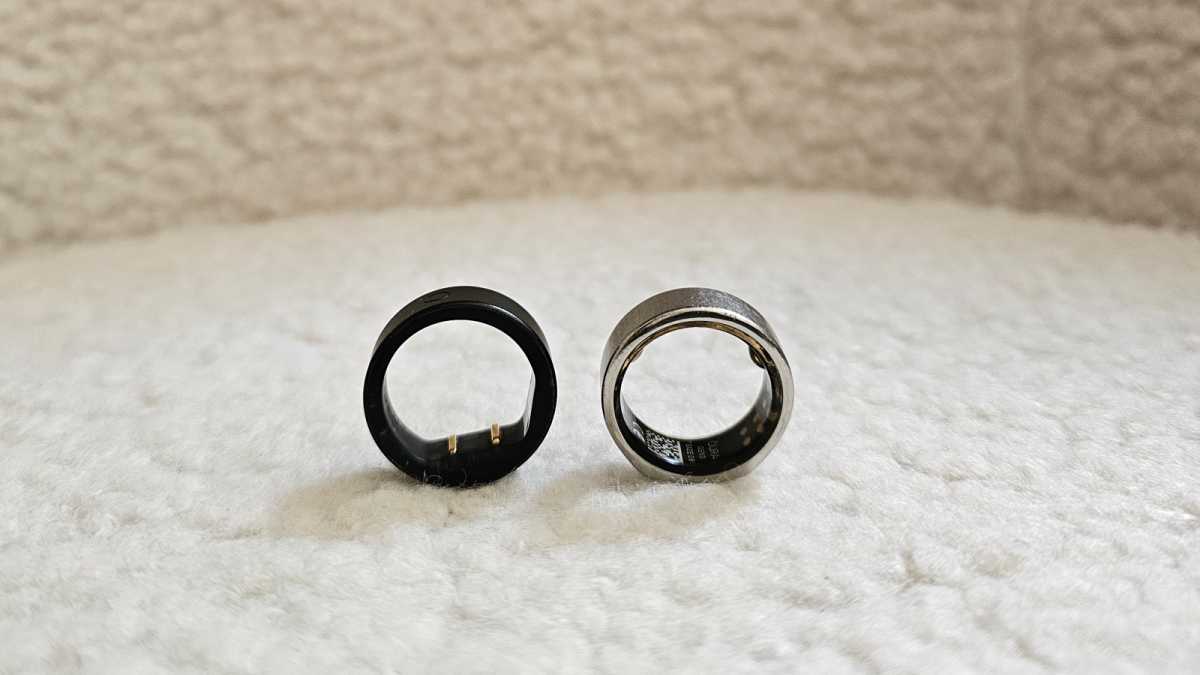
Mike Sawh
Along with the optical sensors baked inside, Circular also builds in a vibration motor, which is used for the alarm feature, which you can set up in the companion app. Once the alarm is set, you can double-tap on the logo to turn it off.
When you need to charge the ring, it comes with a very portable charger that you can clip onto your keys. The USB-C dongle design does make it a little easier to misplace than other smart ring chargers and plugging it into something like a laptop can be fiddly as adjacent ports likely need to be empty in order to fit the ring on.
But if you like the idea of a small charger setup, this is by far the smallest available on a smart ring right now. Note that the Samsung and RingConn come with charging cases (like wireless earbuds) so you can charge anywhere and multiple times over.
From a durability point of view, the Ring Slim carries an IP68 rating, which means it can be submerged in water up to 5m for 30 minutes. So think of this one as one to keep on for showers and washing your hands. It’s not the strongest water resistance you’ll find on a smart ring.
Fitness & Tracking
- Tracks steps, sleep, heart rate and stress
- Kira+ smart assistant
- Dedicated sports tracking mode
The Circular Ring Slim packs in familiar smart ring sensors. There’s an infrared one along with one red and one green LED sensor. Those are used for heart rate and blood oxygen tracking as well tracking metrics like breathing rate.
There’s also a skin temperature sensor to help you monitor, well, temperature variations. To cover movement, there’s a 3-axis accelerometer to track activity such as steps and enable sleep monitoring.
I can see from the main dashboard when metrics like resting heart rate has spiked or there’s been a big variation in skin temperature.
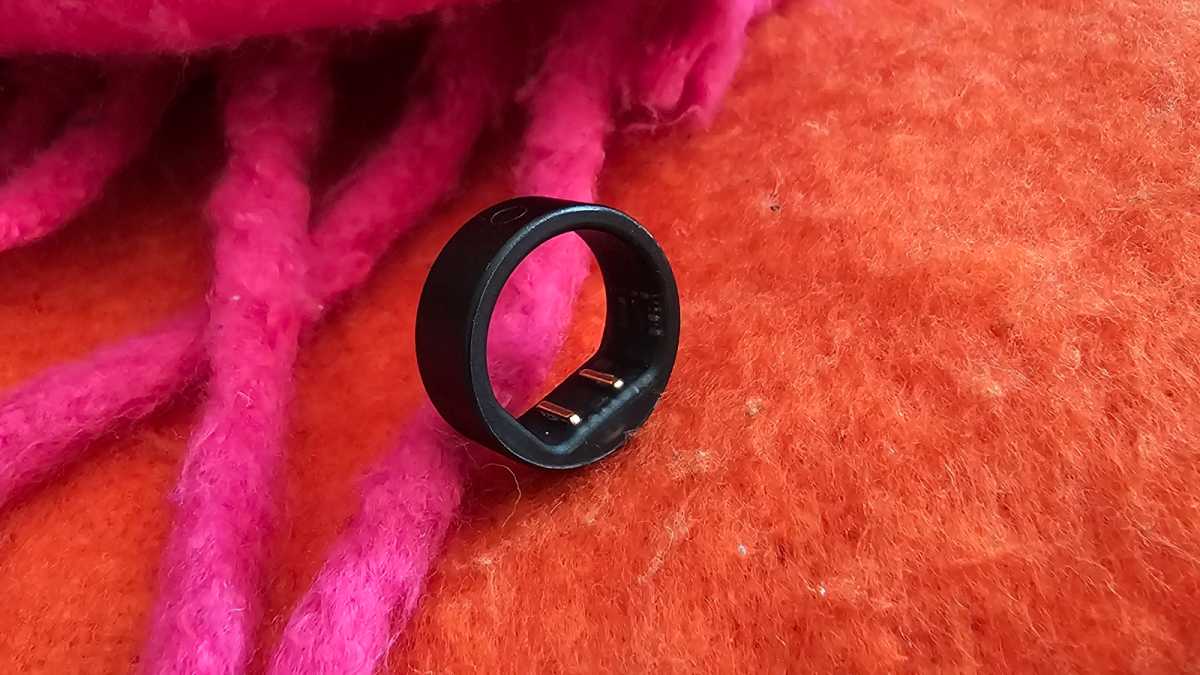
Mike Sawh
All of that data is synced to the Circular companion smartphone app, which is available for both iPhone and Android and as mentioned, doesn’t require a subscription to access all of the features and insights available – unlike some rivals such as Oura.
The app is a bit on the busy side and while the setup process was pretty faultless (although Tech Advisor Reviews Editor, Chris struggled to get his paired for a while), aspects like data syncing can take a while.
There’s storage capacity on the ring for up to 20 days worth of data, but ultimately you’re going to want to engage with that app on a daily basis to get a sense of what your data is saying about your general well-being. Waiting around for that data to appear is a bore.
When you do get the data, there’s a lot going on here. You’ve got Circles at the top of the app, to offer shortcuts to different monitoring data for starters.
There’s a dashboard of your latest stats below that and now Circular has added space for telling you when is a good time for productivity or taking stimulants like coffee. There’s also Kira+, an AI smart assistant that offers recommendations and tips based on your data.
I can see from the main dashboard when metrics like resting heart rate has spiked or there’s been a big variation in skin temperature. The Circles can offer an indicator of when sleep or energy levels are good with simple scoring. The problem is that this all lives on the same page and not in a very user-friendly way.
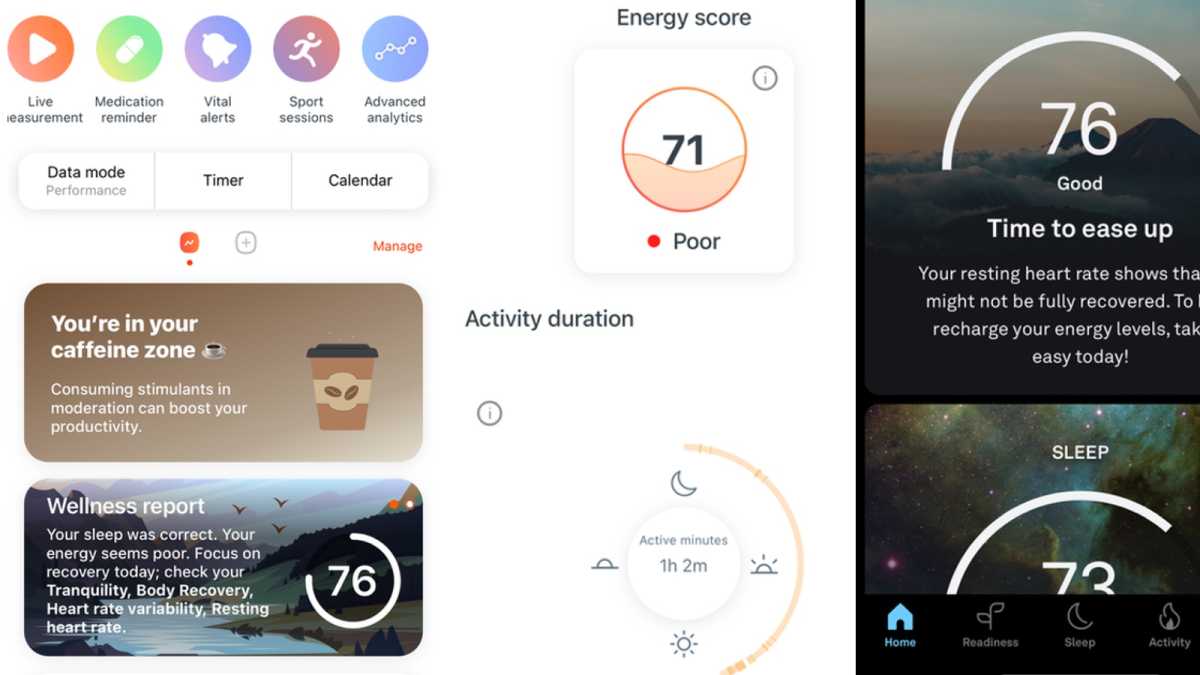
Mike Sawh
When you turn to it for daily activity tracking like counting steps, continuously monitoring heart rate and sleep monitoring, there’s some good and bad.
Step counts felt quite a lot higher on most days compared to two other fitness trackers I wore alongside it. Continuous and resting heart rate readings had their good and bad days too, though at times reported quite low heart rate readings, which Oura does also have a habit of doing at times. It performed well for sleep monitoring matching the Oura for sleep duration, sleep heart rate and offering similar sleep stage breakdowns.
For insights, that’s largely led by your Energy score, which among metrics looks at your sleep to tell you what your energy levels are. It’s scored on percentage, with above 90% seen as optimal and below 80% seen as poor. So on a day of getting up early to run a race and then spending a fair few hours in the pub watching football plus an affected night’s sleep, I had a score of below 80%. My Oura Ring was telling me a similar story.
There’s also the Kira+ AI insights, which gives you a long stream of copy detailing your data and then offering suggestions, but these are pretty basic things. You can also log activities each time you sync the app, so given I logged that I had some alcohol it explains how that will have affected my sleep quality.
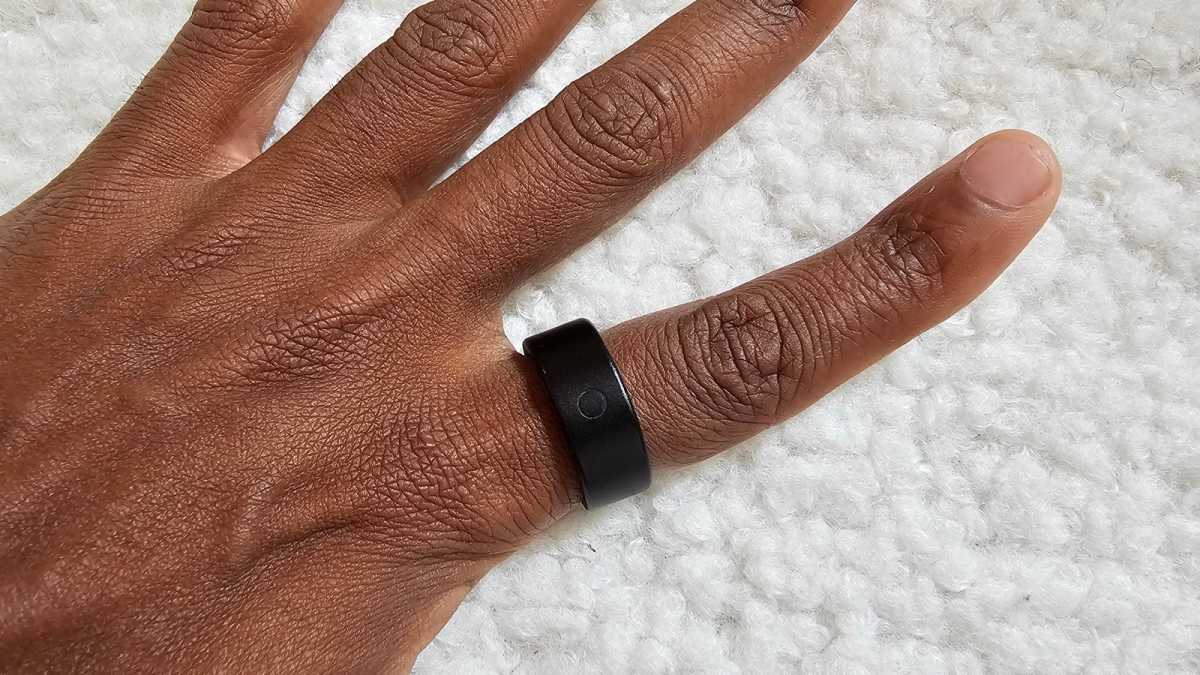
Mike Sawh
It tells me things like to use the in-app guided breathing features or to do some meditation to keep my stress levels low. There’s nothing groundbreaking here, it feels pretty general in terms of its usefulness so branding it as AI might set expectations too high.
There are some extra features here like the ability to take on-the-spot heart rate, heart rate variability and SpO2 readings. You can set up medication reminders, receive vitals alerts and there’s also a dedicated sports tracking mode, which lets you lean on your phone’s GPS to track outdoor activities.
Unfortunately, the tracking isn’t good at all. Distance tracking did not work and heart rate tracking was highly unreliable, even for stationary workouts.
Battery Life & Charging
- Up to 5-day battery life
- Performance and Eco battery modes
- Charges fully in 45 minutes
The Circular Ring Slim claims it can last for up to 5 days in between charges.
It also offers two battery modes with a Performance one giving you the best and most accurate tracking accuracy and an Eco one where heart rate monitoring is tracked at a less frequent rate and you’ll miss out on sleep stats like sleep stages.
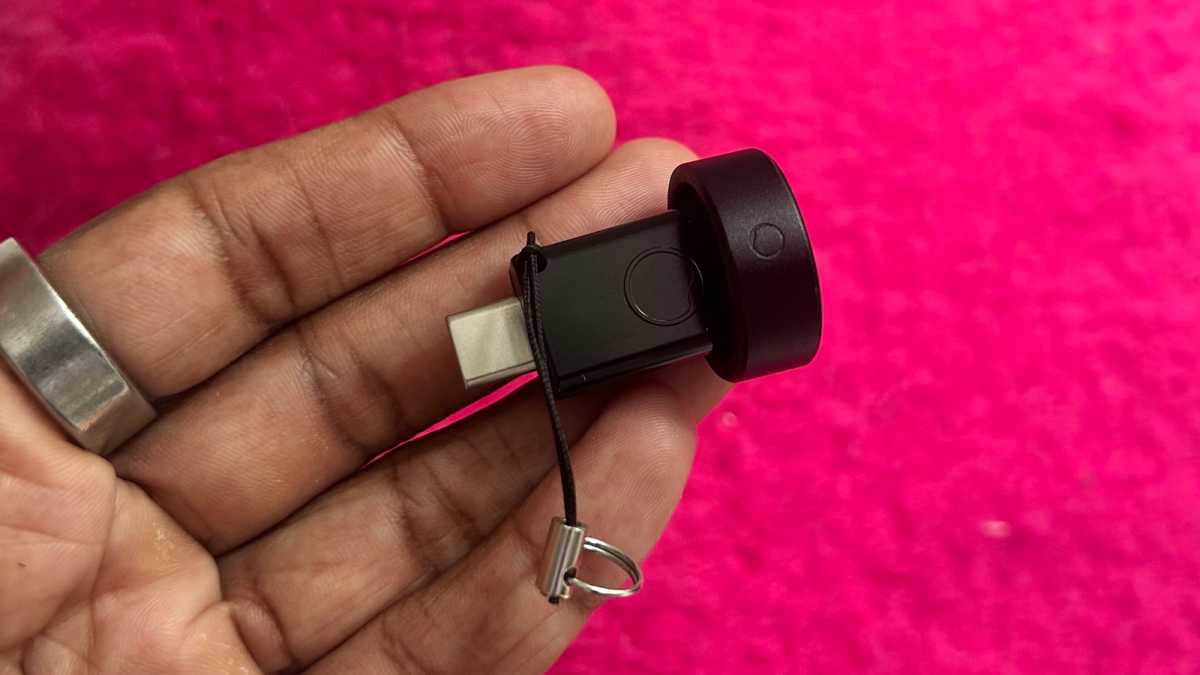
Mike Sawh
I found that in the Performance mode, the Slim lasted two days. If you opt for the Eco mode it pushes a little closer to that 5 days, but in the process, you’re sacrificing the level of accuracy and data, which isn’t exactly faultless in that Performance mode anyway.
As mentioned earlier, when it comes to charging, it’s a different process to charging other smart rings. I think the idea of the case that RingConn and now Samsung has opted for feels like the ideal solution.
Instead, Circular has opted for something smaller that does fully charge the ring in under an hour but can be slightly awkward charger to find a great spot and while it’s a magnetic setup, it’s easily knocked out of place.
Price & Availability
The Circular Ring Slim is priced at £226/$281/€294 and you can buy it from the official Circular store.
Compared to other smart rings, it’s considerably cheaper than the £399/$399 you’ll need to pay for a Samsung Galaxy Ring, while the Oura Ring Gen 3 costs £299. However, that does require a £5.99/$5.99 monthly subscription on top.
The subscription-free RingConn Smart Ring costs $279 (approx (£220), while the Ultrahuman Ring Air is priced at £329/$349.
So, it’s not the cheapest smart ring available, but it’s certainly not one of the priciest either.
Should you buy the Circular Ring Slim?
When I look at all of the other smart rings that are available and I’ve tested and look at where the Circular Smart Ring Slim sits among them, I don’t feel like it beats the best in the form of the Oura Ring Gen 3 and it doesn’t better the other subscription-free options that are available like the RingConn Smart Ring and Ultrahuman Ring Air.
It lacks a more memorable design (though some may love it) and while some of its core tracking skills work well, the package doesn’t quite put it there with the best. The software is too busy and it doesn’t offer a feature set that betters what else is available from other smart rings.
It might be the thinnest smart ring, but it’s not the best one to put on your finger right now.
Specs
- 2.2mm thickness
- 5-day battery life
- Works with Android and iOS (free subscription)
- IP68 waterproof
- Weighs 2g
- PPG sensor for heart rate and SpO2 monitoring
- Temperature sensor
- 3D accelerometer motion sensor
- Bluetooth Smart low energy






